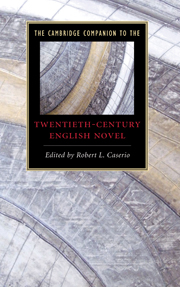Book contents
- Frontmatter
- Introduction
- 1 The art of English fiction in the twentieth century
- 2 The British Empire and the English modernist novel
- 3 Realism and rebellion in Edwardian and Georgian fiction
- 4 The Great War in English fiction
- 5 Postwar modernism in the 1920s and 1930s: The mammoth in the basement
- 6 Regionalism in English fiction between the wars
- 7 Ireland and English fiction
- 8 Feminist fiction
- 9 Working-class fiction across the century
- 10 World War II, the welfare state, and postwar “humanism”
- 11 The Windrush generation
- 12 History in fiction
- 13 Postmodernisms of English fiction
- 14 Detectives and spies
- 15 The post-consensus novel: Minority culture, multiculturalism, and transnational comparison
- 16 An absurd century: Varieties of satire
- 17 The other side of history: Fantasy, romance, horror, and science fiction
- Further reading
- Index
8 - Feminist fiction
Published online by Cambridge University Press: 28 July 2009
- Frontmatter
- Introduction
- 1 The art of English fiction in the twentieth century
- 2 The British Empire and the English modernist novel
- 3 Realism and rebellion in Edwardian and Georgian fiction
- 4 The Great War in English fiction
- 5 Postwar modernism in the 1920s and 1930s: The mammoth in the basement
- 6 Regionalism in English fiction between the wars
- 7 Ireland and English fiction
- 8 Feminist fiction
- 9 Working-class fiction across the century
- 10 World War II, the welfare state, and postwar “humanism”
- 11 The Windrush generation
- 12 History in fiction
- 13 Postmodernisms of English fiction
- 14 Detectives and spies
- 15 The post-consensus novel: Minority culture, multiculturalism, and transnational comparison
- 16 An absurd century: Varieties of satire
- 17 The other side of history: Fantasy, romance, horror, and science fiction
- Further reading
- Index
Summary
Miriam Henderson, heroine of Dorothy Richardson's 1931 novel Dawn's Left Hand, rails against her literary mentor, lover, and antagonist Hypo Wilson, “The torment of all novels is what is left out. The moment you are aware of it, there is torment in them. Bang, bang, bang, on they go, these men's books, like an L.C.C. tram, yet unable to make you forget them, the authors, for a moment.” Miriam, a fiercely independent New Woman who works as a secretary in a Harley Street dental surgery and spends her nights writing book reviews and translations, is resisting Hypo's efforts to turn her into his kind of female novelist. Hypo, a character based on H. G. Wells, envisions Miriam swept out of the bustle of London, nesting in “green solitude” with an infant - her infant - at her side. Miriam rejects Hypo's image of her in the role of mother as part of her effort to discover in London a freedom from others' demands and values. Along with Richardson, Miriam also rejects the known pleasures of plot, character, and narration. Like many feminist writers of the twentieth century, Richardson believed that only a radically new imagining of the novel's forms could enrich literature with the truth of modern female experience, an experience left out of “all novels” and especially “these men's books.”
Richardson's desire to invent a new woman's novel led to her epic 13-volume Pilgrimage, of which Dawn's Left Hand is the tenth part. Unfinished at Richardson's death in 1957, Pilgrimage is one of the most innovative and important English fictions, but it is also one of the most neglected, rarely earning in-depth critical attention or even a reprinting. The difficulty of gaining access to Pilgrimage (and other texts discussed in this chapter) points to an unfinished quest by feminist literary critics, who are just now able to look back at a century of novels with some sense of surveying a contained field.
- Type
- Chapter
- Information
- The Cambridge Companion to the Twentieth-Century English Novel , pp. 114 - 130Publisher: Cambridge University PressPrint publication year: 2009
- 1
- Cited by



